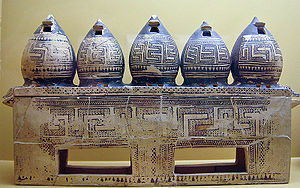Difference between revisions of "Category:Tanks, Vessels"
Jump to navigation
Jump to search
m |
m |
||
| Line 1: | Line 1: | ||
[[Category:Storage]] | [[Category:Storage]] | ||
[[File:tanks_vessels.jpg|thumb|300px|right| | [[File:tanks_vessels.jpg|thumb|300px|right|Ancient Greek geometric art box in the shape of granaries, 850 BC. On display in the Ancient Agora Museum in Athens, housed in the Stoa of Attalos.]] | ||
Throughout history, wood, ceramic and stone have been used as | Throughout history, wood, ceramic and stone have been used as granaries. These were all naturally occurring and man made and some tanks are still in service. | ||
The Indus Valley Civilization (3000–1500 BC) made use of water tanks. Medieval castles needed | The Indus Valley Civilization (3000–1500 BC) made use of water tanks. Medieval castles needed tanks for the defenders to withstand a siege. | ||
[http://liquidswiki.com/index.php?title=Category:Tanks,_Vessels More information about tanks for liquids] | [http://liquidswiki.com/index.php?title=Category:Tanks,_Vessels More information about tanks for liquids] | ||
Revision as of 22:52, 9 March 2013
Throughout history, wood, ceramic and stone have been used as granaries. These were all naturally occurring and man made and some tanks are still in service.
The Indus Valley Civilization (3000–1500 BC) made use of water tanks. Medieval castles needed tanks for the defenders to withstand a siege.
Pages in category "Tanks, Vessels"
The following 23 pages are in this category, out of 23 total.
